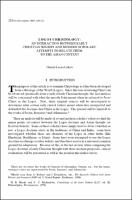| dc.contributor.author | Lukito, Daniel Lucas | |
| dc.date.accessioned | 2020-06-24T03:08:51Z | |
| dc.date.available | 2020-06-24T03:08:51Z | |
| dc.date.issued | 1993 | |
| dc.identifier.uri | http://repository.seabs.ac.id/handle/123456789/677 | |
| dc.description.abstract | The purpose of this article is to examine Christology as it has been developed from a theology of the Word (Logos). Since this way of viewing Christ can be observed specifically from a study of early Christian thought, the first analysis will be concerned with what the apostle John meant when he referred to Jesus Christ as the Logos. Next, three original sources will be investigated to determine what certain early church fathers meant when they interpreted and defended the doctrine that Christ is the Logos. This pursuit will be limited to the works of Justin, Irenaeus,and Athanasius. Then an analysis will be made of several modern scholars’ efforts to find the major points of contact between the Logos doctrine and Asian thought (or Eastern beliefs). Some of these scholars have simply tried to detect whether or not a Logos doctrine exists in the traditions of China and India; some have investigated whether there are elements of the Logos in other faiths (like Hinduism, Buddhism, or Islam). Some have even attempted to use the Logos doctrine as a bridge to other beliefs, and thus have used it as a universal common ground for adaptation. Because of this, in the last section, when comparing the Logos doctrine of early Christian thought with these modern proposals, critical evaluations will be presented as well as the position this author favors. | en_US |
| dc.publisher | Stulos Theological Journal v. 1, no. 2 | en_US |
| dc.subject | Jesus Christ -- History of doctrines -- Early church, ca. 30-600. | en_US |
| dc.subject | Jesus Christ -- History of doctrines -- 20th century. | en_US |
| dc.title | Logos Christology : An Interaction Between Early Christian Beliefs and Modern Scholars Attempts to Relate Them to the Asian Context | en_US |
| dc.type | Article | en_US |

